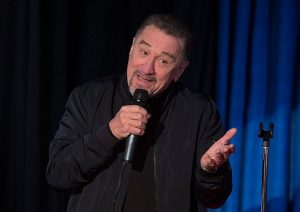The Comedian
Posted on February 2, 2017 at 5:32 pm

They say all clowns want to play Hamlet, and often they turn out to be outstanding dramatic actors, from Mickey Rooney to Robin Williams. But it does not always work the other way. Dramatic performers want to be clowns. Robert De Niro is one of the greatest actors in the world and he can be very funny (“Analyze This,” “Midnight Run,” “Silver Linings Playbook”). He does not always choose the best material (“Dirty Grandpa”), but like his fellow Oscar winners Tom Hanks and Sally Field, that doesn’t mean he can play the part of a stand-up comic. It is generally understood that stand-up comedy is the most difficult and terrifying of all in show business professions because they go out on stage with nothing but their ideas and a microphone — no script, no other performers, no sets, no music — just the comic and his or her ideas, and an audience expecting to be amused. Comic and comedy writer Dylan Brody told me that stand-up comics who want to be on television have to be able to deliver four laughs a minute.
In “The Comedian,” De Niro plays Jackie, an “insult comic,” whose humor is based on his ability to fire off quick, punchy, provocative responses to the people around him, to be outrageous by saying what people might think but would never admit to. Jackie was once the star of a popular “Honeymooners”-style television show and is constantly annoyed when fans of the show ask him to repeat his character’s catch phrase.
The problem is that Jackie is never as funny as the movie thinks he is and needs him to be. De Niro makes us see Jackie’s frustration at constantly being confronted with having his most popular work over long ago and not something he was especially proud of even at the time. (See Ricky Gervais in “Extras” for a much better exploration of this theme.) But when it gets to the crucial moments of his performances, he never gets the rhythm of the jokes or shows us the mental imperatives that keep comedians punching. Cloris Leachman (another Oscar winner) does better as a 95-year-old stand-up being “honored” with a Friar’s Club roast. Though she is old and frail, we see in her the fearlessness that made it possible for her to do the one thing tougher than being a make stand-up; being a female stand-up. Her character, a Phyllis Diller/Joan Rivers type, still has the reflexes and gutsiness of someone who has spent decades, going back to the 50’s, relying only on her wit, proving herself in front of audiences. And the cast includes real stand-ups, like Billy Crystal and Hannibal Buress, who remind us what comedians really sound like.
Jackie gets into trouble punching a heckler — not because he insults him but because he appropriates Jackie’s routine for his web series. He is sentenced to 30 days in jail plus community service and it is at the homeless shelter where he is putting in his hours that he meets Harmony (Leslie Mann), also working off an assault charge (her ex and his new girlfriend). Not the greatest of meet-cutes. He brings her to his niece’s wedding where he makes a toast that is profane and insulting but everyone, including Harmony and the bride, thinks it is hilarious (except for his sister-in-law, a terrifically furious Patti LuPone). He then does stand-up at a nursing home where once again, he is profane and insulting but everyone thinks it is hilarious (except for Harmony’s father, a what-is-he-doing-in-this-movie Harvey Keitel). The greatest acting challenge in this movie is pretending Jackie is funny.
Parents should know that this film includes very strong and crude language with insulting epithets, bodily function and sexual humor, intentionally offensive and provocative jokes, sexual situation, references to drug overdose, assaults, and discussion of a sad death of a child.
Family discussion: Why didn’t Jackie enjoy hearing from fans of his television show? Was Jackie funny? Why?
If you like this, try: “Sleepwalk With Me,” “Punchline,” “Mr. Saturday Night”
